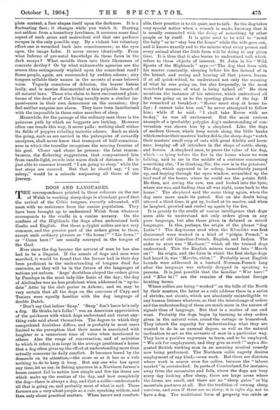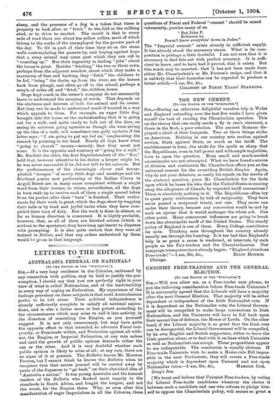T HE correspondence printed in these columns on the use of
Welsh in working sheep-dogs is abundant proof that the revival of the Celtic tongues, recently advocated, will meet with no resistance from the canine population. They have been brought up to understand Welsh from whatever corresponds to the cradle in a canine nursery. On the confines of the Highlands the dogs often understand both Gaelic and English. But these polyglot collies are not very common, and the greater part of the orders given to them, except such ordinary phrases as "Go home !" "Lie down !" or "Come here !" are usually conveyed in the tongue of the Gael.
Ever since the dog became the servant of man be has also had to be a linguist. If the annals of dogs and men were searched, it would be found that the former had in their day been proficient in the understanding of tongues dead for centuries, as they will be in the future of the languages of nations yet unborn. 'Argo' doubtless obeyed the orders given by Penelope in the most lady-like Ionic of the day; the dog of Alcibiades was no less proficient when addressed in "up-to- date" Attic by the club porter in Athens ; and we may be very certain that all the dogs on the canvases of Cuyp and Teniers were equally familiar with the dog language of double Dutch.
"Don't say that before Snap.' 'Snap' ' don't know he's only a dog. He thinks he's folks ! " was an American appreciation of the quickness with which dogs understand and resent any- thing rude said about themselves. The degree to which they comprehend doubtless differs, and is probably in most cases limited to the perception that their name is associated with laughter or a censorious tone of voice when mentioned to others. .Also the range of conversation, and of activities to which it refers, is so large in the average gentleman's house that a dog often gives up the effort at understanding more than actually concerns its daily comfort. It becomes bored by the demands on its attention,—the more so as it has as a rule nothing to do to keep it busy. But any one who has spent any time, let us say, in fishing quarters in a Northern farmer's house cannot fail to notice bow simple and few the items are which make up the routine of the day, and how completely the dog—there is always a dog, and that a collie—understands all that is going on, and probably most of what is said. These farmers are a very silent people as a rule, speaking seldom, and then only about practical matters. When hannv and comfort- able, their practice is to sit quiet, not to talk. So the dog takes very special notice when a remark is made, knowing that it is usually connected with the doing of something by other people or by itself. It is quite used to be told to "mind the baby" or to" stay ben the house" while the wife goes out, and it knows exactly and to the minute what every person and every animal about the little farm will be doing at any given time. It is thus that it also learns to understand talk which refers to these objects of interest. St. John in his "Wild Sports of the Highlands" says :—" The dog that lives with his master constantly, sleeping before his fire instead of in the kennel, and seeing and hearing all that passes, learns, if at all quick-witted, to understand not only the meaning of what he sees going on, but also frequently, in the most wonderful manner, of what is being talked of." He then mentions the instance of his retriever, which understood all that was going on as to the sporting plans of the day. If he remarked at breakfast : "Rover must stop at home to- day ; I cannot take him out," he never attempted to follow him ; while if he said: "I shall take Rover with me to-day," he was all excitement. But the most curious example of a (probably) polyglot dog's understanding of con- versation was shown him by a shepherd. Like the dogs of modern Greece, which keep watch along the little banks which enclose their masters' barley-fields, the sheep-dogs" watch their masters' small crop of oats with great fidelity and keen- ness, keeping off all intruders in the shape of cattle, sheep, and horses. A shepherd once, to prove the value of his dog, which 1:as lying before the fire in the house where we were talking, said to me in the middle of a sentence concerning something else, 'I'm thinking, Sir, the cow is in the potatoes.' The dog, which appeared to be asleep, immediately jumped up, and leaping through the open window, scrambled up the turf roof of the house, where he could see the potato field. He then, not seeing the cow, ran and looked into the byre, where she was, and finding that all was right, came back to the house." The shepherd said the same thing again, when the dog once more made its patrol. But on the doubt being uttered a third time, it got up, looked at its master, and when he laughed, growled and curled up again by the fire.
It is greatly to the credit of canine intelligence that dogs seem able to understand not only orders given in any pure language, but also those given in debased or mixed languages. Is this, perhaps, the origin of the phrase "dog Latin "P The dog-teams used when the Klondike was first discovered were worked in a kind of "pidgin French," a mixture of old Canadian-French, English, and Indian. The order to start was " Macharn! " which all the trained dogs understood. This the English miners turned into "March on!" Its origin, and the form in which the first sledge-dogs had heard it, was "Marche, chien ! " Probably most English hounds were addressed in a bastard Norman-French long after the language was entirely dropped in speaking to persons. It is just possible that the familiar "War hare !" and " Eloo in!" are the remains of the ancient foreign hunting terms.
Where collies are being " worked " on the hills of the North by their masters, the latter as a rule address them in a series of shrieks, not shouts, which are absolutely unintelligible to any human listener whatever, so that the interchange of orders and the understanding of them are much more in the nature of signals than of language. But that is a matter of use and wont. Probably the dogs begin by learning to obey orders given in the natural voice, round the cottage or homestead. They inherit the capacity for understanding what they are wanted to do in an unusual degree, as well as the natural inclination to act as the servants of man in a particular way. They have a positive eagerness to learn, and to be employed. "We ask for employment, and they give us work !" says a dis- gusted British working man in an amusing musical comedy now being performed. The Northern collie eagerly desires employment of any kind,—even work. But there are districts where work is scarce even for collies, because the "labour market" is overstocked. In parts of Cumberland, for instance, away from the mountains and fells, where the dogs are busy every day looking after sheep, there are large areas where the farms are small, and there are no "sheep gates" or big mountain pastures at all. But the tradition of owning sheep survives, and even if there are no sheep, it is infra dig. not to have a dog. The traditional form of property was cattle or sheep, and the presence of a dog is a token that there is property to look after, to " fetch " to the fold or the milking shed, or to drive to market. The result is that to every mile of road there are about ten yellow collies, most of which belong to the ranks of the unemployed for the greater part of the day. To fill in part of their time they sit on the stone walls contemplating the passers-by, and hoping against hope that a stray animal may come past which they can aid in "rounding up." But their ingenuity in finding "jobs" about the house is great. Besides "fetching" the two or three cows, perhaps from the adjacent meadow, about which they make a maximum of fuss and barking, they " fetch " the chickens to be fed, " bring " the ducks up from the river, see the horses back from plough, and often go off to the school, perhaps a couple of miles off, and "fetch" the children home.
Dogs kept much in the owner's company do not necessarily learn to understand the meaning of words. That depends on the alertness and interest of both the animal and its owner. But they can be made to understand much if treated in a way which appeals to them. For example, an eager little dog, brought into the house on the understanding that it is going out for a walk, and quite ready to bolt out of the door, on seeing its mistress going upstairs as though she were giving up the idea of a walk, will sometimes run gaily upstairs if the latter says : "I am going to put my hat on," emphasising the remark by pointing to her head. Nearly all dogs know what "going to church "• means,—namely, that they must not come. It is the opposite and contrary of "going for a walk." Mr. Bartlett the elder, the first Superintendent of the "Zoo," held that, however attentive to his duties a keeper might be, he was never successful if he did not talk to his animals. But the performances of the charmingly clever and accom- plished " troupes " of merry little dogs and monkeys and the Shetland ponies now performing at the Italian Circus in Argyll Street are in many cases completed without a single word from their trainer, to whom, nevertheless, all the dogs in turn rush up to receive each of them a single morsel taken from his pocket after their "turn" is finished. Their enthu- siasm for their work is great, which the dogs show by wagging their tails or by loud and joyful barks when they have com- pleted their turn of duty. But the work is done in silence, so far as human direction is concerned. It is highly probable, however, that, as all of them are finished artists (which is evident to the spectator), they have long ago learnt to dispense with prompting. It is also quite certain that they were all trained in Italian, and that any orders understood by them would be given in that language.























































 Previous page
Previous page